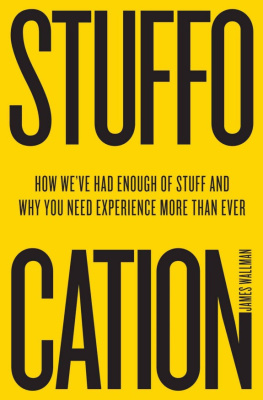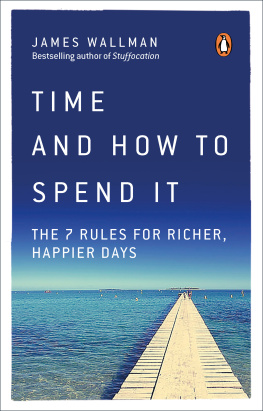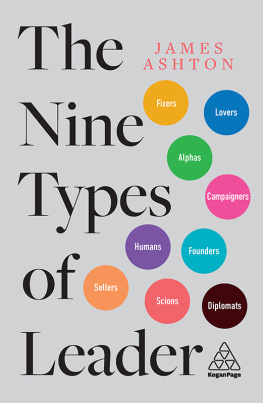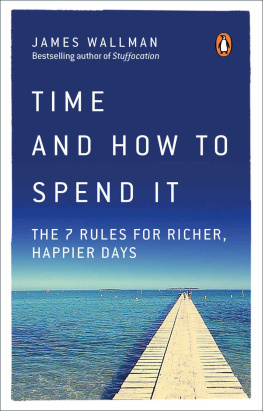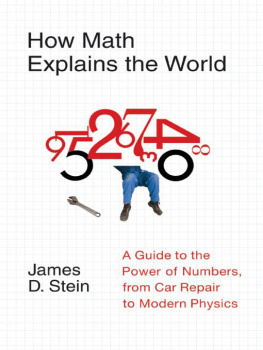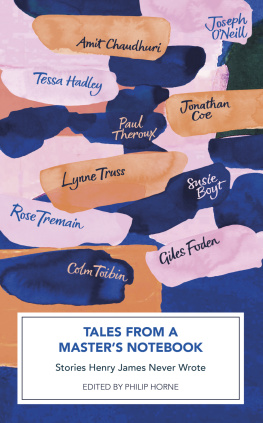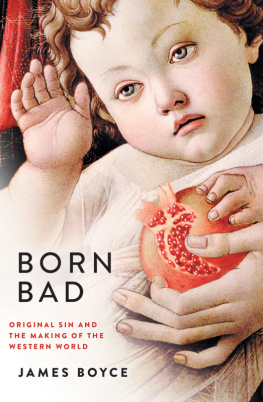STUFFOCATION
How We've Had Enough of Stuff and
Why You Need Experience More than Ever
JAMES WALLMAN

CONTENTS
The Farm Boy who Discovered
the Secret to Forecasting
Barbra Streisand
and the Law of Unintended Consequences
STUFFOCATION
First published in the United Kingdom in 2013 by Crux Publishing Ltd.
ISBN: 978-0-9575245-2-1
Copyright by James Wallman, 2013
James Wallman has asserted his right to be identified as the author of this work in accordance with the Copyright, Designs and Patents Act 1988.
The author is grateful for permission to include the following previously published copyrighted material:
Quotations from Monty Pythons Life of Brian by Graham Chapman, John Cleese, Terry Gilliam, Eric Idle, Terry Jones, and Michael Palin. Copyright 1979. Used by kind permission of Python (Monty) Pictures Ltd.
Excerpt from The medium chill by David Roberts, Grist.org. Copyright 2011. Used by kind permission of Grist Magazine, Inc.
All rights reserved under International and Pan-American Copyright Conventions. By payment of the required fees, you have been granted the non-exclusive, non-transferable right to access and read the text of this e-book on screen. No part of this text may be reproduced, transmitted, down-loaded, decompiled, reverse engineered, or stored in or introduced into any information storage and retrieval system, in any form or by any means, whether electronic or mechanical, now known or hereinafter invented, without the express written permission of Crux Publishing Ltd.
The author and publisher will be grateful for any information that will assist them in keeping future editions up-to-date. Although all reasonable care has been taken in the preparation of this book, neither the publisher, editors nor the author can accept any liability for any consequences arising from the use thereof, or the information contained therein.
Requests for permission to reproduce material from this work should be sent to
Also available in paperback
ISBN: 978-1-909979-00-0
www.cruxpublishing.co.uk
About the Author
James Wallman is a journalist, trend forecaster, and speaker. He has commented on trends happening now, and predicted what will happen next, for publications like GQ, the New York Times, and the Financial Times, and for clients such as Absolut, BMW, Burberry, and Nike. He wrote the futurology column in T3 magazine from 2008-2012, and was editor of a trend consultancy called The Future Laboratorys forecasting publication, LS:N Global, from 2009-2013.
James has an MA in Classics from Oxford University and an MA in Journalism from the University of the Arts London. He has lived in France, Greece, and Palo Alto in California. He currently lives in London, with his wife and daughter.
Follow him on Twitter @jameswallman
For Thiru and Indy-May
And for Jack, Pam, Guy, and Elsie
A Note from the Author
The case studies in the book are not compound characters. They are real people. Their stories are true. All scenes and events actually happened.
James Wallman, London, November 2013
INTRODUCTION
How We've Had Enough of Stuff
A few years back, on a Monday morning in September 2010, a man by the name of Ryan Nicodemus woke up in a room that was bare except for a bed. Outside, the sky was blue. There was a light breeze. People were starting the week, sipping coffee, starting their cars, driving north for Dayton, south for Cincinnati. It was a day like any other.
Nicodemus, a square-jawed Irish-American who could pass for the movie star Ben Affleck, sat up and squinted. There was no bedside lamp or table, no pictures, no nothing, except for the bed hed slept on and the sheets hed slept under.
He pulled the sheets back and padded across the carpeted floor, past the empty closets, into the hallway. It was all the same stripped bare. The only thing there was, was an eerie sound. It was really strange, Nicodemus recalls. Like silence, but very echoey.
If you had been there, waking up alone in that house, you would have thought youd woken up in some sort of surreal dream, in a strange house the day after the owners had moved out and left all their things in boxes and bin bags at the foot of the stairs.
Nicodemus went down and picked up a box. He read the label Miscellaneous no. 7 and put it to one side. He picked up another Kitchen junk no. 2 and did the same. He kept going till he found Bathroom no. 1. He rummaged inside. He pulled out shower gel, toothpaste, toothbrush. He started on the bags, till he found, and took out, one towel. He tied the bags closed, he shut the boxes, and he went upstairs to shower.
As water washed over him, Nicodemus wondered. How did it feel? Odd? Better? Was a home with no stuff better or worse? He hadnt woken up in a dream, you see. Hed woken up in an experiment.
At the time, Nicodemus was 28, and doing well. He had a girlfriend, a house, a job. He was making over $100,000 a year, working for a telecoms company called Cincinnati Bell. He liked what he did. He liked the people he worked with. He got a kick out of seeing his employees develop and helping them sell one or two more things, so they could make their bonus or win that incentive trip to Hawaii. He wore Brooks Brothers suits, $300 shoes, and $100 ties. He had a hundred $100 ties. At the weekend, he went off-roading on a $8,000 four-wheeler with his buddies. He played Xbox and watched movies on his top-of-the-line, 53 Samsung TV. He drove a brand new, metallic blue Toyota Tacoma, one of those big boys toys that looks like a life-size Tonka Truck.
If youd told my 18-year-old self what I was going to have at 28, Nicodemus says now. I wouldve been the most excited 18-year-old there ever was. I wouldve been, like, are you kidding me? This is gonna be the best life ever!
But ten years later, it did not feel like the best life ever. Nicodemus was not happy. Instead, he was confused. I almost felt, he says, ungrateful cause I had everything Id always wanted.
At first, he kept plugging away, working, spending, hoping the feeling would go. But no matter how much he earned and how many things he bought, he could not shake it. Then a thought occurred to him. Maybe there had been a mistake. Maybe the happiness equation was wrong.
The Happiness Equation
Nicodemus grew up poor, in a place called Lebanon population 20,000, average income $20,000 in Ohio in the north-eastern United States. When his parents split he stayed in a run-down apartment with his mother. She was too busy with drink and drugs to notice the cleaning, the cockroaches, Ryan. Aged 12, he moved in with his father. Eric ran a small business called Nicodemus Fine Paint and Wallcovering. He was a devout Jehovahs Witness. He kept a clean house. Was it inevitable that Ryan ricocheted like a pinball between his fathers god and his mothers demons? He took drugs. He went to church. He ate a lot.
During school holidays, he worked for his father. He saw how the other half decorated their homes and how they seemed to have the sort of happiness he longed for.
One day, father and son were in their overalls at a job. The house was nothing fancy. Everything was modern and new, apart from a grandfather clock in the hallway. As Ryan was setting things up, taking the family pictures off the walls, he noticed that the people in the pictures looked real happy. That morning, the owners had seemed pretty happy, too. Maybe they were. Looking around, he wondered: maybe this nice, middle-class house was the kind of home happy people lived in.
Dad, he said. How much would I have to make to own a house like this?
Next page
